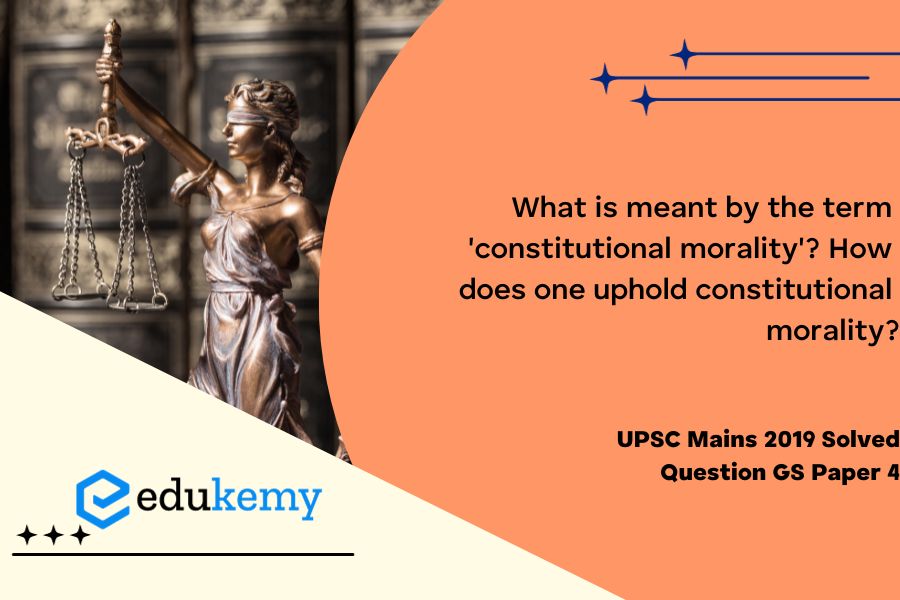Constitutional morality refers to the adherence and commitment to the principles, values, and spirit enshrined in a constitution. It goes beyond legal compliance and embodies a collective understanding of justice, equality, and fundamental rights within the constitutional framework. Essentially, it is a shared commitment to the ideals that form the foundation of a nation’s constitution. Upholding constitutional morality involves respecting the rule of law, promoting inclusivity, and safeguarding individual liberties. Citizens and public officials alike play a pivotal role in maintaining constitutional morality by being aware of and adhering to constitutional principles in their daily lives. This includes supporting legal and policy measures that align with constitutional values, engaging in informed civic participation, and fostering a culture of accountability. Ultimately, upholding constitutional morality requires a continuous effort to ensure that the ideals of justice, liberty, and equality remain at the forefront of societal and governmental actions.
Contents
Decoding the Question:
- In the Introduction, define Constitutional morality.
- In Body,
- Write a few points about Constitutional morality with examples.
- Explain how Constitutional morality can be upheld.
- Conclude, by mentioning the importance of Constitutional morality.
Answer:
According to Dr. B. R. Ambedkar, Constitutional morality means effective coordination between the conflicting interests of people and the administrative cooperation to resolve them without any confrontation amongst the various groups working toward the realization of their ends.
In classicist George Grote’s perspective, it means “paramount reverence for the forms of the constitution, enforcing obedience to authority and acting under and within these forms, yet combined with the habit of open speech, of action subject only to definite legal control, and unrestrained censure of those very authorities.”

Constitutional morality:
- Constitutional morality involves adherence to Constitutional principles of democracy like, commitment to liberty, Constitutional supremacy, parliamentary form of government and self-restraint, rule of law, equality, etc.
- Example: In the Supreme Court’s Sabarimala verdict religious freedom, gender equality, and the right of women to worship guaranteed under Articles 14, 21, and 25 of the Constitution was reinstated which struck down the practice of banning entry of women of a certain age to the Sabarimala temple in Kerala as unconstitutional.
- Constitutional morality here went against social morality that discriminates against women based on biological reasons like menstruation.
Constitutional morality can be upheld by:
- By letting constitutional morality guide the Court’s decision instead of popular morality while interpreting the Constitution.
- By locating the content and contours of constitutional morality so that it is not being ignorantly and dangerously used in courts.
- By committing to the values like constitutional supremacy, rule of law, liberty, equality, parliamentary form of government, self-restraint intolerance for corruption, etc.
- By using it as an aid in making choices because it can give another set of clues while searching for constitutional meaning in cases wherein the words of the constitutional clause can be read in different ways.
- By having paramount reverence for the forms of the constitution, enforcing obedience to authority, and acting under and within these forms.
Public conscience, moral order, and constitutional morality- ethics of politicians, that constitute the core of policy-making, must be very sound and strong if democracy is to survive for a long period of progress and prosperity of the people. Constitutional morality is a governing ideal that reflects the need to preserve the public trust in democratic institutions. It is significant for constitutional laws to be effective in implementation. Without constitutional morality, the operations of a constitution tend to become arbitrary.
In case you still have your doubts, contact us on 9811333901.
For UPSC Prelims Resources, Click here
For Daily Updates and Study Material:
Join our Telegram Channel – Edukemy for IAS
- 1. Learn through Videos – here
- 2. Be Exam Ready by Practicing Daily MCQs – here
- 3. Daily Newsletter – Get all your Current Affairs Covered – here
- 4. Mains Answer Writing Practice – here


